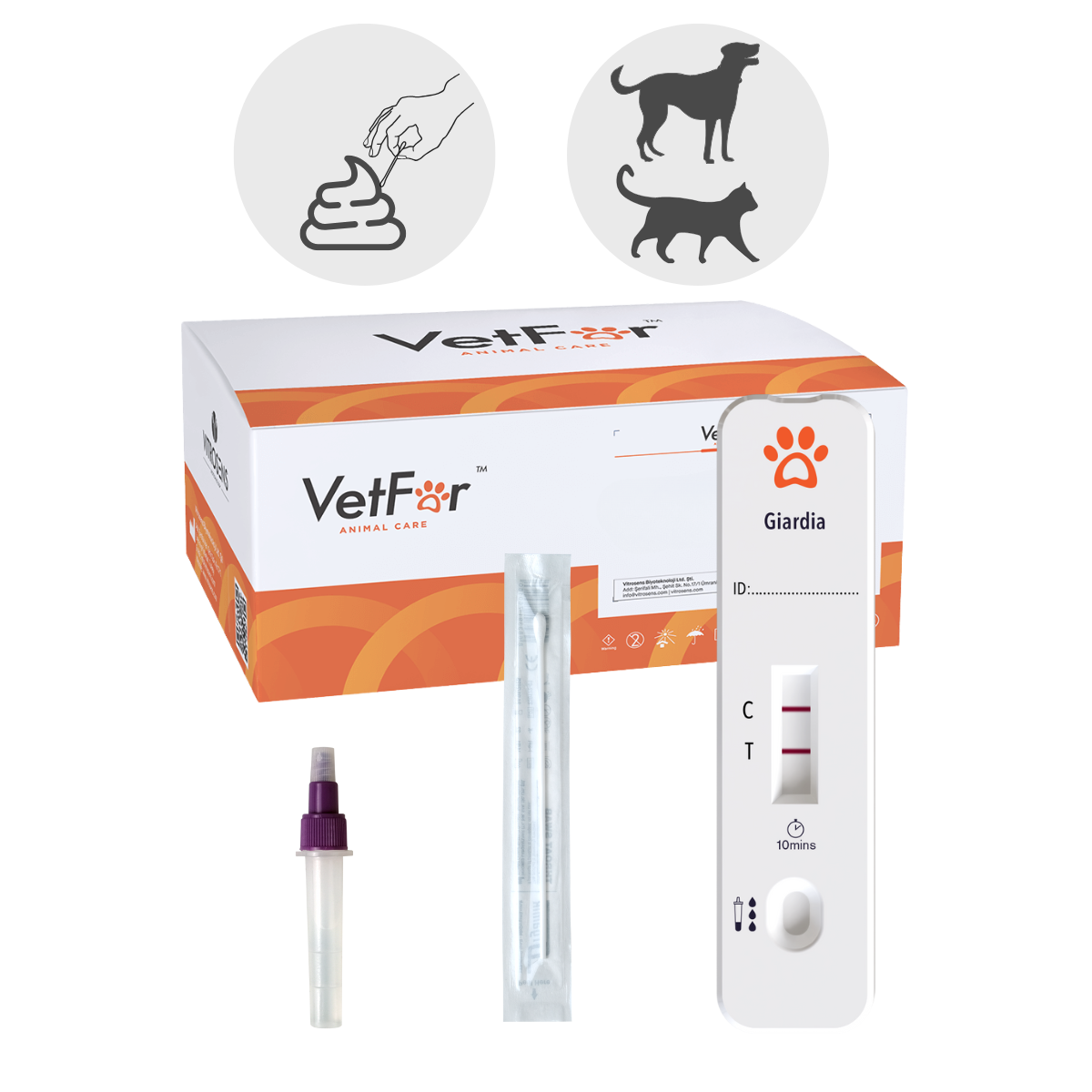Giardien Antigen Test
The VetFor™ Giardia Antigen Rapid Test is intended for the rapid detection of specific antigens of the Giardia duodenalis parasite in fecal samples from dogs and cats.
52,00 €
| Quantity | Price | Discount |
|---|---|---|
| 3-5 | 50,44 € | 3% |
| 6-9 | 48,88 € | 6% |
| 10+ | 46,80 € | 10% |
| Sample type |
Faeces |
|---|---|
| Target specie |
Canine (Dog) ,Feline (Cat) |
| Target |
Giardia (Dog & Cat) |
| Packaging unit |
10 Tests |
| Sensitivity |
98,0 % |
| Specificity |
100% |
VetFor™ Giardien Antigen Rapid Test
The VetFor™ Giardia Antigen Rapid Test is a veterinary in vitro diagnostic test for the rapid and reliable detection of Giardia duodenalis antigens in fecal samples from dogs and cats. The test is based on the principle of the lateral sandwich immunoassay and provides clear results within a few minutes. The ready-to-use kit contains all the necessary components for performance and is intended for use by veterinary professionals.
Product details
- Test type: Lateral sandwich immunoassay
- Target pathogen: Giardia duodenalis
- Sample material: Fecal samples from dogs or cats
- Result time: Rapid test with direct evaluation after 10 minutes
- Limit of detection: 1 × 10⁵ TCID₅₀ / mL
- Storage conditions: 2 – 30 °C
- No cross-reactions with other pathogens detected
Performance data
Sensitivity: 98,0 %
Specificity: 100,0 %
Accuracy: 98,90 %
Content
- 10 test cassettes (1 test/bag)
- 10 disposable bottles with dilution solution
- 10 sterile disposable sample swabs
- 1 instruction manual
For professional use only!
SHELF LIFE AND STORAGE
- The test kit must be stored at a temperature between 2 °C and 30 °C and a relative humidity of 40% to 60%. All components must be brought to room temperature before testing.
- Do not open sealed pouches and test kits until immediately before use.
- The test is stable until the expiration date. Do not use the test kit after the expiration date. The expiration date is indicated on the label/packaging of the sealed foil pouch.
- Do not expose the test kit to direct sunlight.
NOTES
- For in vitro diagnostic use only.
- For optimal test results, the manufacturer's instructions should be followed precisely.
- The tests should be conducted in compliance with biosafety measures and with protective clothing.
- The test kits must be kept in their sealed packaging until use.
- Do not use the test kit if the pouch is damaged or the seal is broken.
- The components of the test kit must not be reused.
- All components must be brought to room temperature before testing.
- The test kit may only be used up to the indicated expiration date.
- The components of this test kit have been tested as a standard batch.
- Do not exchange or mix components from different test kits.
- Do not touch the uncovered areas of the membrane in the test cassette.
- Inadequate or incorrect sample collection as well as improper storage and transport conditions may falsify the test results.
- All components of the test kit should be disposed of as infectious material.
You must be logged in to post a review.
Expert Knowledge on Giardiasis in Dogs and Cats
Translated from German version
Giardia are single-celled parasites that infest the small intestine of dogs and cats, causing a disease known as giardiasis. The primary causative agent is Giardia intestinalis (also known as Giardia duodenalis), a flagellate that can infect both animals and humans.
Transmission and Epidemiology
Giardia transmission primarily occurs through the ingestion of cysts present in contaminated water, food, or on dirty surfaces. These cysts are resilient and can survive in the environment for several months. Dogs and cats often become infected by drinking from puddles, ponds, or licking contaminated surfaces. Giardia can also be transmitted between different animal species, with certain genotypes capable of infecting both animals and humans.
Symptoms
Affected animals often show symptoms such as recurring, light-colored, slimy, and foul-smelling diarrhea; in some cases, it may be bloody. Vomiting, abdominal pain, bloating, weight loss, weakness, and fever are also common signs. However, it is important to note that not all infected animals show symptoms; some may remain asymptomatic, making diagnosis more challenging.
Diagnosis
Diagnosis is typically made by examining stool samples, where cysts or trophozoites of Giardia can be microscopically identified. Molecular tests such as PCR (Polymerase Chain Reaction) can also be used to detect the parasite's genetic material in feces. Since cyst excretion is not always consistent, repeated tests over several days may be necessary to definitively diagnose an infection.
Treatment
Treatment typically involves antiparasitic medications such as fenbendazole or metronidazole, which kill the Giardia parasites. It is also important to thoroughly clean and disinfect the animal's environment to prevent re-infection, as cysts can survive in the environment for several months. Symptoms can be more severe in puppies and young animals, so prompt and consistent treatment is essential.
Prevention
Preventive measures include avoiding access to potentially contaminated water, regularly cleaning food and water bowls, and, if necessary, regular deworming and parasite control. Dogs and cats should be kept away from potentially infected animals, and regular Giardia testing should be conducted in households with multiple animals to prevent the spread of infection.
References
- Deutsche Familienversicherung. Giardien - Ursachen, Symptome, Behandlung. Available at https://www.deutsche-familienversicherung.de/tierkrankenversicherung/hundekrankenversicherung/ratgeber/artikel/giardien-ursachen-symptome-behandlung/
- Zooplus. Giardien bei Katzen: Symptome, Behandlung & Vorbeugung. Available at https://www.zooplus.de/magazin/katze/katzengesundheit-pflege/giardien-bei-katzen
- Tierklinik Ismaning. Giardien bei Hund & Katze. Available at https://www.tierklinik-ismaning.de/giardien-bei-hund-katze/
- Canikur. Giardien beim Hund erkennen und richtig behandeln. Available at https://www.canikur.de/was-sind-giardien
- AniCura Deutschland. Giardien Katze, Durchfall, Darmparasit. Available at https://www.anicura.de/fuer-tierbesitzer/katze/wissensbank/giardien-bei-katzen/
- Fressnapf. Giardien beim Hund: Ansteckung, Symptome & Behandlung. Available at https://www.fressnapf.ch/de/magazin/hund/gesundheit/giardien/
- Royal Canin. Giardien-Infektion bei Hunden - Vet Focus. Available at https://vetfocus.royalcanin.com/de/wissenschaft/giardien-infektion-bei-hunden
- Wikipedia. Giardiasis. Available at https://de.wikipedia.org/wiki/Giardiasis
- Wikipedia. Giardia intestinalis. Available at https://de.wikipedia.org/wiki/Giardia_intestinalis

Reviews
Clear filtersThere are no reviews yet.